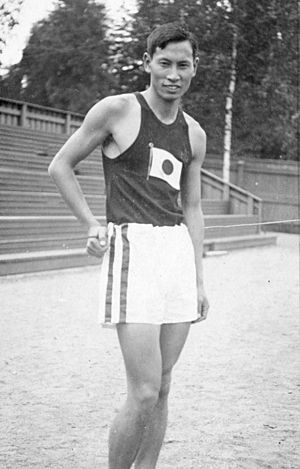Mikio Oda facts for kids
 |
||||||||||||||||||||||||||||||||||||||||||||
| Personal information | ||||||||||||||||||||||||||||||||||||||||||||
|---|---|---|---|---|---|---|---|---|---|---|---|---|---|---|---|---|---|---|---|---|---|---|---|---|---|---|---|---|---|---|---|---|---|---|---|---|---|---|---|---|---|---|---|---|
| Native name | 織田 幹雄 | |||||||||||||||||||||||||||||||||||||||||||
| Nationality | Japanese | |||||||||||||||||||||||||||||||||||||||||||
| Born | 30 March 1905 Kaita, Japan |
|||||||||||||||||||||||||||||||||||||||||||
| Died | 2 December 1998 (aged 93). Fujisawa, Kanagawa, Japan |
|||||||||||||||||||||||||||||||||||||||||||
| Alma mater | Waseda University | |||||||||||||||||||||||||||||||||||||||||||
| Height | 1.67 m (5 ft 6 in) | |||||||||||||||||||||||||||||||||||||||||||
| Weight | 65 kg (143 lb) | |||||||||||||||||||||||||||||||||||||||||||
| Sport | ||||||||||||||||||||||||||||||||||||||||||||
| Sport | Athletics | |||||||||||||||||||||||||||||||||||||||||||
| Club | Waseda University, Tokyo | |||||||||||||||||||||||||||||||||||||||||||
|
Medal record
|
||||||||||||||||||||||||||||||||||||||||||||
Mikio Oda (織田 幹雄, Oda Mikio, 30 March 1905 – 2 December 1998) was a Japanese athlete. He made history by becoming the first Japanese person to win a gold medal at the Olympic Games. He was also the first Asian athlete to win an individual Olympic championship.
Contents
Early Life and Athletic Start
Mikio Oda was born in Kaita, Hiroshima Prefecture, Japan. He showed great talent in sports from a young age. When he was just 17 years old, he competed in the Far Eastern Championship Games in Osaka.
Setting New Records
At the 1923 Far Eastern Championship Games, Mikio Oda set a new Japanese record in the triple jump. He also won gold medals in the long jump and a bronze medal in the high jump events. His amazing performance earned him a spot on the Japanese Olympic team.
Olympic Journey
Mikio Oda competed in three Olympic Games. His journey began in Paris and led to a historic win in Amsterdam.
First Olympics: Paris 1924
Oda joined the Japanese team for the 1924 Summer Olympics in Paris. He competed in the triple jump, long jump, and high jump. While he didn't win a medal in Paris, he gained valuable experience. He finished sixth in the triple jump competition.
Historic Gold: Amsterdam 1928
After studying at Waseda University, Oda returned to the Olympics. He competed in the 1928 Summer Olympics in Amsterdam. This time, he made history! He won the gold medal in the triple jump event. His winning jump was 15.21 meters. This made him the first Japanese athlete to ever win an Olympic gold medal. He was also the first Asian to win an individual Olympic event.
Later Olympics: Los Angeles 1932
After his gold medal win, Oda continued his career. In 1931, he set a new world record for the triple jump, reaching 15.58 meters. He then served as a coach and captain for the Japanese athletics team at the 1932 Summer Olympics in Los Angeles.
Life After Competing
After retiring from competitive sports, Mikio Oda dedicated his life to sports administration. He helped organize and promote athletics in Japan and around the world.
Contributions to Sports
- He became a member of the Japanese Olympic Committee in 1948.
- He joined the technical committee of the IAAF, a major international sports organization.
- He coached the Japanese athletics team at the 1952 Summer Olympics in Helsinki.
- He also coached at the 1954 Asian Games in Manila.
Honoring His Legacy
Mikio Oda's achievements were remembered in many ways:
- During the 1964 Summer Olympics in Tokyo, the Olympic flag was raised to exactly 15.21 meters. This was the exact height of his gold-medal-winning jump 36 years earlier.
- A running track in Yoyogi, built for the 1964 Olympics, was named "Oda Field" in his honor.
- An annual track and field competition, the Mikio Oda Memorial International Amateur Athletic Game, was created in 1967.
Later Life and Awards
Mikio Oda became a professor at Waseda University in 1965. In 1976, he received the Olympic Order. This is the highest award given by the Olympic Movement. In 1988, the Japanese government honored him as a Person of Cultural Merit. He passed away in 1998. In 2000, experts chose him as the best Asian male athlete of the century.
See also
 In Spanish: Mikio Oda para niños
In Spanish: Mikio Oda para niños 
- List of Olympic medalists in athletics (men)
- List of people on the postage stamps of Japan
 | DeHart Hubbard |
 | Wilma Rudolph |
 | Jesse Owens |
 | Jackie Joyner-Kersee |
 | Major Taylor |

